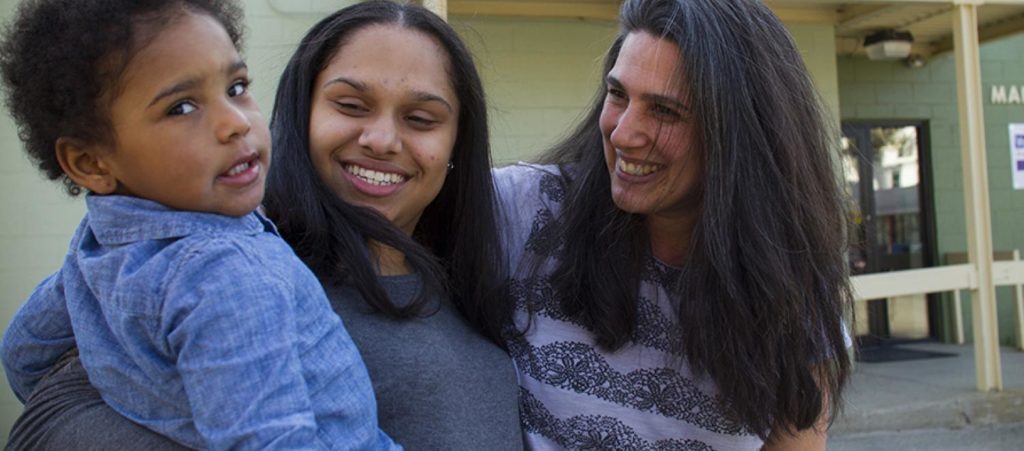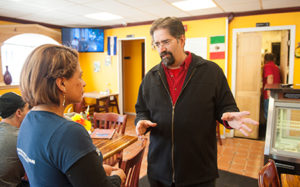
The professors and students in Clark’s Community Development and Planning (CDP) program learn from and work alongside members of the very community they want to transform. Their research not only pursues solutions to problems besetting urban neighborhoods, but also helps governments and nonprofits aspire to a more socially just world.
Food and the local economy
Associate Professor Ramón Borges-Méndez coordinates the graduate CDP program, part of the Department of International Development, Community and Environment (IDCE). He has also facilitated Clark’s involvement with the Working Cities Challenge, which will design a workforce development strategy for Worcester’s food-driven economy. Part of a Federal Reserve Bank of Boston/Living Cities initiative, the project is also seeking to create a network of business-support services for ethnic restaurants and food retailers in Worcester’s commercial corridors, particularly in Main South. Borges-Méndez authored the project’s abstract, which was vetted by 21 local organizations and the Office of the City Manager, and he has collaborated with a host of local agencies as well as Worcester State University and Quinsigamond Community College.

(Photo by Steve King)
Sixty percent of Working Cities would be dedicated to creating infrastructure and support to cultivate job and career-development opportunities for disadvantaged workers in the food-service industry. A specific piece involves developing a culturally competent platform for the city’s Inspectional Services, to make sure that ethnic restaurant owners understand what is required of them, Borges-Méndez explains. Other initiatives include culinary and food preparation workshops, and “A Taste of Main South,” modeled after the annual Taste of Worcester event where people can sample food from many restaurants.
The Working Cities Challenge project “presents a set of opportunities for students to connect with internships, directed studies and field research,” Borges-Méndez says.
The project also fosters a “network of innovation” between the university and community. CDP professors include alumni of the program. That’s intentional: CDP forges ties among faculty, students, projects, alumni, practitioners and the city. Clark alumni are a very important force at City Hall.
The program links Clark students with organizations in Worcester and beyond — and attracts resources. A proposal-writing that matches students to city nonprofits has accumulated more than $250,000 in grants for those organizations, Borges-Méndez says.
Families, neighborhoods and
preventing youth violence
Along with Borges-Méndez, Associate Professor Laurie Ross ’91, M.A. ’95, and full-time lecturer Professor Kathryn Madden are the core CDP professors. Madden recently taught a project-based course on the intersection of economic and community development in Worcester. “I want to make sure my students know they can make a difference by generating ideas and framing a problem — that you can change the direction of things,” she says.
As a Clark graduate student working with the Worcester Family Research Project, Ross was part of a team that followed approximately 400 families over several years to examine the causes and effects of poverty and homelessness on women and children.
“The babies had a perfectly normal distribution of intelligence,” Ross recalls. “Over time, we saw the older kids were skewed toward lower achievement and lower ability. That’s what showed me the effect of poverty on children’s development, and got me most interested in the connection between youth and community development.”
Read more about Laurie Ross’work in Worcester and her new book, Dilemmas in Youth Work and Youth Development Practice(Routledge).
For 10 years, Clark has been the research partner of Worcester’s Senator Charles E. Shannon Jr. Community Safety Initiative, which provides legislative funding to reduce gang violence across Massachusetts. Ross and her students have identified persistent trends of violence concentrated among African-American and Latino men.
“The question was: If we’ve invested this much over the last six years, why are these trends continuing?” she says.
Her “Needs Assessment and Practicum” classes pursued an answer, first performing a comprehensive assessment of youth violence in Worcester and then using their findings as the basis for a series of community dialogues and meetings.
“We now have a plan that’s in the process of being implemented, addressing the factors we found were driving violence,” Ross says.
The assessment found that about 30 percent of men most often involved in violence in Worcester had their first experience with police before age 12, often as a victim or as a witness to violence at home. Further, at least 30 percent of those men also have their own children, which means family-focused early intervention is needed to address the cyclical aspects of violence.
Last spring, 400 Worcester police officers received training from the University of Massachusetts Medical Center’s Child Trauma Training Center — a recommendation resulting from the Shannon research. The goal, Ross says, is to strengthen the relationship between law enforcement and families so that police intervention in what is typical adolescent behavior does not necessarily result in an arrest.
“How can we divert these kids away from the juvenile justice system?” she says. “That’s a big part of what we’re trying to do.”
The assessment performed by Ross and her students came at the behest of Worcester Police Sergeant Miguel Lopez, M.P.A. ’01, manager of the city’s Shannon grant and the Safe & Successful Youth program. Lopez says the resulting plan, the Youth Violence Prevention Initiative, addresses the various sources of youth violence in the city.
“Laurie is incredibly well-respected and trusted by the command staff and chief,” Lopez says. “She has the ability to see multiple perspectives. And she didn’t just create the plan and walk away; she’s helping to implement it.”
In 2000, Ross became director of Worcester’s Hope Coalition, which works to reduce youth violence and substance use and promote positive adolescent mental health. Her first task was to recruit peer leaders to perform a youth needs assessment. From that, she developed a 14-week Youth Worker Training Institute, which she later brought to Clark.
Ross’ efforts have culminated in the IDCE’s newly created Certificate in Youth Work Practice. The program offers classes in nonprofit management, program evaluation and grant writing, and more.
“Worcester’s violence rate is quite low for a city of its size,” she says. “We have a very strong prevention sector. The more we can do to build the capacity of grassroots organizations, the less likely kids are going to fall through the cracks.”
Top: Associate Professor Laurie Ross ’91, M.A. ’95, with Dayanara Negron and her daughter, Jediah Russell, outside the Main South Community Development Corporation. (Photo by Matt Healey)


